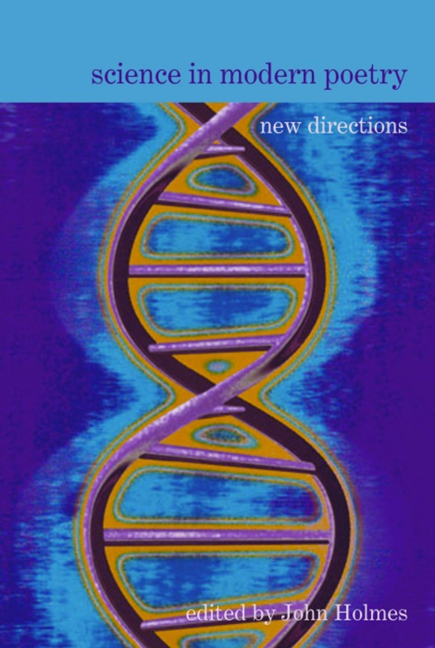Book contents
- Frontmatter
- Contents
- List of Contributors
- Acknowledgements
- Introduction
- Part I Science and Contemporary Poetry: Cross-Cultural Soundings
- Part II Science in Modernist Poetry: Appropriations and Interrogations
- 5 ‘Strange Synthetic Perfumes’: Investigating Scientific Diction in Twentieth-Century Poetry
- 6 The Human Animal: Biological Tropes in Interwar Poetry
- 7 William Empson, Ants and Aliens
- 8 Ezra Pound and the Materiality of the Fourth Dimension
- Part III Darwinian Dialogues: Four Modern Poets
- Afterword
- Bibliography
- Index
6 - The Human Animal: Biological Tropes in Interwar Poetry
from Part II - Science in Modernist Poetry: Appropriations and Interrogations
- Frontmatter
- Contents
- List of Contributors
- Acknowledgements
- Introduction
- Part I Science and Contemporary Poetry: Cross-Cultural Soundings
- Part II Science in Modernist Poetry: Appropriations and Interrogations
- 5 ‘Strange Synthetic Perfumes’: Investigating Scientific Diction in Twentieth-Century Poetry
- 6 The Human Animal: Biological Tropes in Interwar Poetry
- 7 William Empson, Ants and Aliens
- 8 Ezra Pound and the Materiality of the Fourth Dimension
- Part III Darwinian Dialogues: Four Modern Poets
- Afterword
- Bibliography
- Index
Summary
World of young living language! Fold
On vivid fold of changing green
In sapient shoot and lyric leaf,
Exact, appropriate, unseen!
It is full summer, fertile earth
Fulfils her rhythm: line on line
In seas of light and liquid gold,
Grey-silver olive, changing vine […].
Michael Roberts's ‘Earth, Impact’ (1936) has become something of an anchor point for those interested in relations between science and poetry in the 1930s. Alongside the poem's engagement with physics and geology, there is the biological imaginary represented by these lines (ll. 13–20), in which language has the fine structure of organic life, and reading is a kind of parasitic investment in that life (‘Where commentary ivy clings / In deep interstices of mind’ (ll. 23–24)). These metaphors put into practice the aesthetics articulated in Roberts's preface to New Signatures (1932), which compared scientific and poetic knowledge and technique. An interest in biology is something that Roberts shares with a circle of young writers in Cambridge and London, many of them significantly allied to Surrealism and informed about recent developments either by their education or by the popular scientific writings which are such a feature of the interwar period (see Bowler, 2009; Stableford, 1985). In this essay I will explore how three of these writers, Herbert Read, William Empson and W. H. Auden, as well as one predecessor, John Rodker, built on three developments in particular which seemed to have a bearing on the understanding of the human as animal: the emergence of endocrinology (the study of hormones); a fascination with the social life of insects; and the new concept of neoteny within evolutionary biology.
The period after 1900 saw major advances in the science of biological systems. Two things stand out in the shifting understanding of life in the period: firstly, a greater emphasis on the interactions of the biochemical and neurological systems, derived from the study of hormones and proteins and their role; secondly, a shift from a strictly mechanistic sense of bodily engineering (associated with Loeb, Beard and others) to a more holistic approach which stresses the interaction of the organism's genetic makeup and environment within an evolutionary, homeostatic perspective (the idea of homeostasis was developed by Walter B. Cannon and popularised by J. B. S. Haldane and others).
- Type
- Chapter
- Information
- Science in Modern PoetryNew Directions, pp. 101 - 115Publisher: Liverpool University PressPrint publication year: 2012



